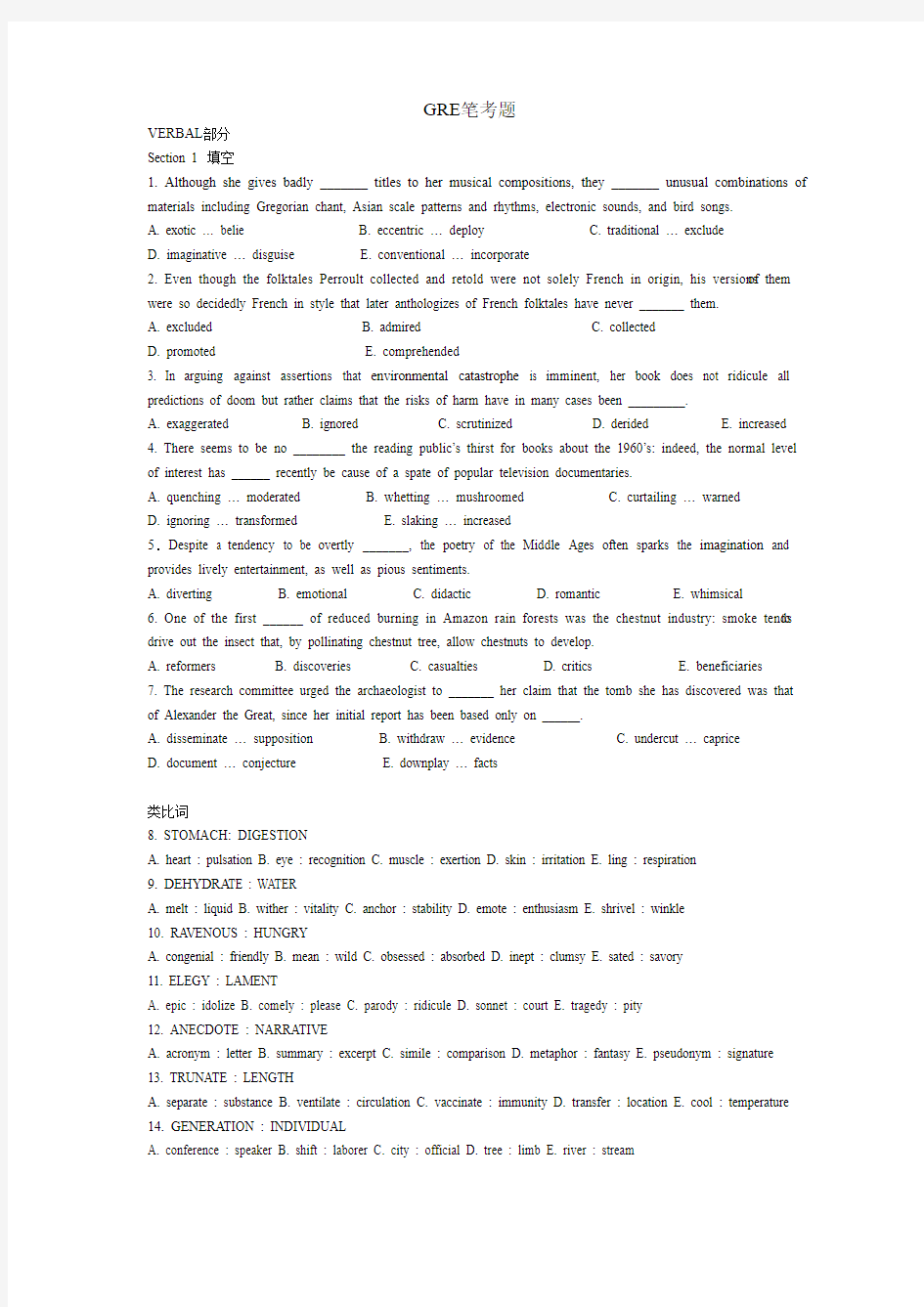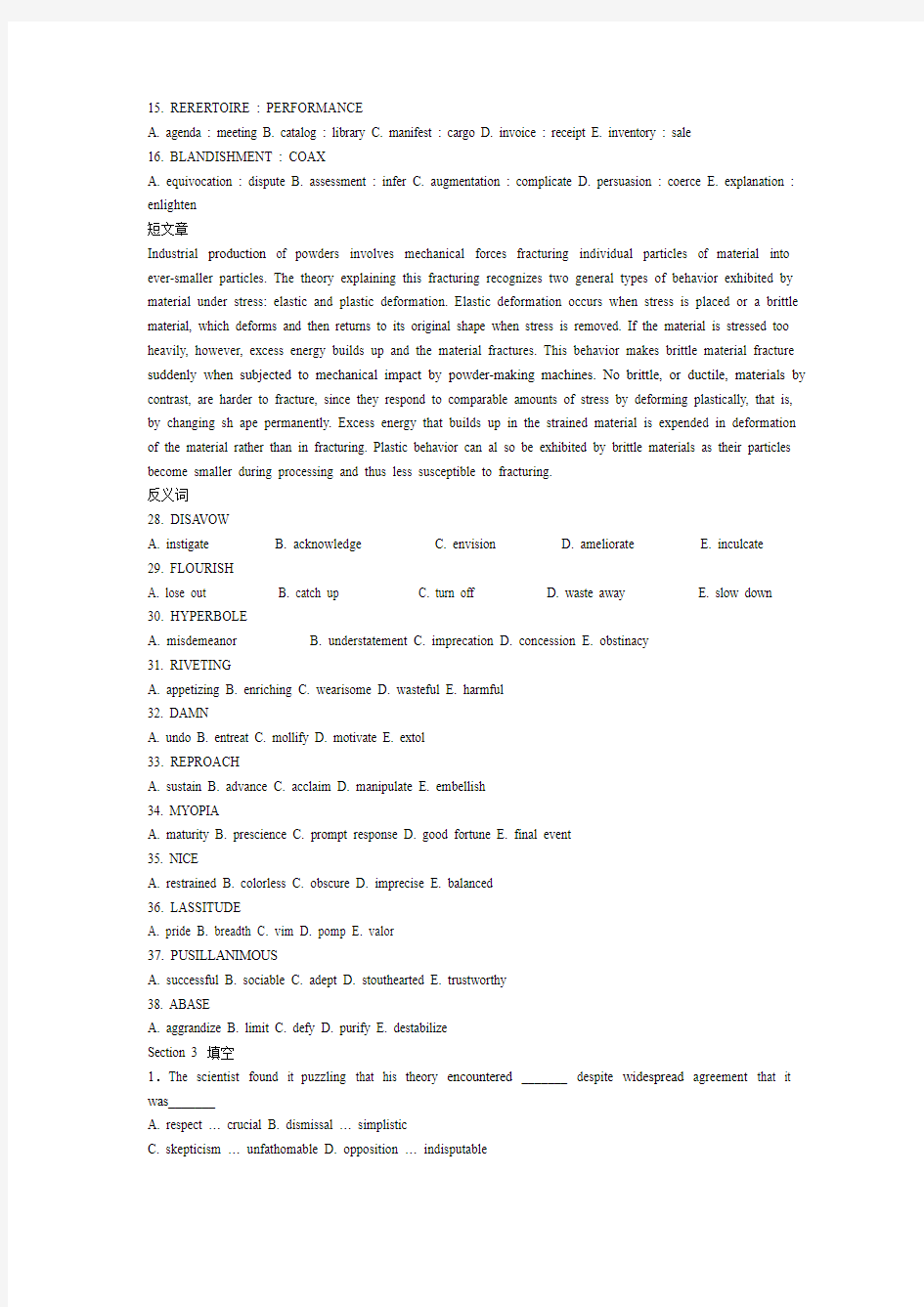

GRE笔考题
VERBAL部分
Section 1 填空
1. Although she gives badly _______ titles to her musical compositions, they _______ unusual combinations of materials including Gregorian chant, Asian scale patterns and rhythms, electronic sounds, and bird songs.
A. exotic … belie
B. eccentric … deploy
C. traditional … exclude
D. imaginative … disguise
E. conventional … incorporate
2. Even though the folktales Perroult collected and retold were not solely French in origin, his versions of them were so decidedly French in style that later anthologizes of French folktales have never _______ them.
A. excluded
B. admired
C. collected
D. promoted
E. comprehended
3. In arguing against assertions that environmental catastrophe is imminent, her book does not ridicule all predictions of doom but rather claims that the risks of harm have in many cases been _________.
A. exaggerated
B. ignored
C. scrutinized
D. derided
E. increased
4. There seems to be no ________ the reading public’s thirst for books about the 1960’s: indeed, the normal level of interest has ______ recently be cause of a spate of popular television documentaries.
A. quenching … moderated
B. whetting … mushroomed
C. curtailing … warned
D. ignoring … transformed
E. slaking … increased
5.Despite a tendency to be overtly _______, the poetry of the Middle Ages often sparks the imagination and provides lively entertainment, as well as pious sentiments.
A. diverting
B. emotional
C. didactic
D. romantic
E. whimsical
6. One of the first ______ of reduced burning in Amazon rain forests was the chestnut industry: smoke tends to drive out the insect that, by pollinating chestnut tree, allow chestnuts to develop.
A. reformers
B. discoveries
C. casualties
D. critics
E. beneficiaries
7. The research committee urged the archaeologist to _______ her claim that the tomb she has discovered was that of Alexander the Great, since her initial report has been based only on ______.
A. disseminate … supposition
B. withdraw … evidence
C. undercut … caprice
D. document … conjecture
E. downplay … facts
类比词
8. STOMACH: DIGESTION
A. heart : pulsation
B. eye : recognition
C. muscle : exertion
D. skin : irritation
E. ling : respiration
9. DEHYDRA TE : WATER
A. melt : liquid
B. wither : vitality
C. anchor : stability
D. emote : enthusiasm
E. shrivel : winkle
10. RA VENOUS : HUNGRY
A. congenial : friendly
B. mean : wild
C. obsessed : absorbed
D. inept : clumsy
E. sated : savory
11. ELEGY : LAMENT
A. epic : idolize
B. comely : please
C. parody : ridicule
D. sonnet : court
E. tragedy : pity
12. ANECDOTE : NARRATIVE
A. acronym : letter
B. summary : excerpt
C. simile : comparison
D. metaphor : fantasy
E. pseudonym : signature
13. TRUNATE : LENGTH
A. separate : substance
B. ventilate : circulation
C. vaccinate : immunity
D. transfer : location
E. cool : temperature
14. GENERA TION : INDIVIDUAL
A. conference : speaker
B. shift : laborer
C. city : official
D. tree : limb
E. river : stream
15. RERERTOIRE : PERFORMANCE
A. agenda : meeting
B. catalog : library
C. manifest : cargo
D. invoice : receipt
E. inventory : sale
16. BLANDISHMENT : COAX
A. equivocation : dispute
B. assessment : infer
C. augmentation : complicate
D. persuasion : coerce
E. explanation : enlighten
短文章
Industrial production of powders involves mechanical forces fracturing individual particles of material into ever-smaller particles. The theory explaining this fracturing recognizes two general types of behavior exhibited by material under stress: elastic and plastic deformation. Elastic deformation occurs when stress is placed or a brittle material, which deforms and then returns to its original shape when stress is removed. If the material is stressed too heavily, however, excess energy builds up and the material fractures. This behavior makes brittle material fracture suddenly when subjected to mechanical impact by powder-making machines. No brittle, or ductile, materials by contrast, are harder to fracture, since they respond to comparable amounts of stress by deforming plastically, that is, by changing sh ape permanently. Excess energy that builds up in the strained material is expended in deformation of the material rather than in fracturing. Plastic behavior can al so be exhibited by brittle materials as their particles become smaller during processing and thus less susceptible to fracturing.
反义词
28. DISA VOW
A. instigate
B. acknowledge
C. envision
D. ameliorate
E. inculcate
29. FLOURISH
A. lose out
B. catch up
C. turn off
D. waste away
E. slow down
30. HYPERBOLE
A. misdemeanor
B. understatement
C. imprecation
D. concession
E. obstinacy
31. RIVETING
A. appetizing
B. enriching
C. wearisome
D. wasteful
E. harmful
32. DAMN
A. undo
B. entreat
C. mollify
D. motivate
E. extol
33. REPROACH
A. sustain
B. advance
C. acclaim
D. manipulate
E. embellish
34. MYOPIA
A. maturity
B. prescience
C. prompt response
D. good fortune
E. final event
35. NICE
A. restrained
B. colorless
C. obscure
D. imprecise
E. balanced
36. LASSITUDE
A. pride
B. breadth
C. vim
D. pomp
E. valor
37. PUSILLANIMOUS
A. successful
B. sociable
C. adept
D. stouthearted
E. trustworthy
38. ABASE
A. aggrandize
B. limit
C. defy
D. purify
E. destabilize
Section 3 填空
1.The scientist found it puzzling that his theory encountered _______ despite widespread agreement that it was_______
A. respect … crucial
B. dismissal … simplistic
C. skepticism … unfathomable
D. opposition … indisputable
E. acceptance … comprehensive
2. The rate at which soil can absorb water ________ with continuous wetting, so the longer a _________ lasts, or the greater the rate of precipitation, the higher the percentage of water that will flow across the ground as runoff and enter stream channels.
A. rises … deluge
B. diminishes … drought
C. increases … shower
D. decreases … r ainstorm
E. stabilizes … thaw
3. The ideas expressed in the art historian’s book are more _____ than one would expect or the basis of her rather_________ treatment of her subject in the opening pages.
A. compelling … intriguing
B. accessible … recondit e
C. hidebound … reactionary
D. insightful … innovative
E. dispassionate … evenhanded
4. The meeting on environmental issues produced ________ discussion but no commitment on a plan of action: the many uncertainties surrounding global climatic change and the huge cost of efforts to limit it made the policymakers ____
A. little … voluble
B. heated … contentious
C. cordial … quarrelsome
D. frustrating … affable
E. interminable … businesslike
5. Art that endures often makes an initially disturbing impact: the profound experience that such art seeks to provoke necessarily engenders a certain ___
A. familiarity
B. ennui
C. upheaval
D. intimacy
E. tranquility
6. The history of film reflects the _____ inherent in the medium itself: film combines still photographs to represent continuous motion and, while seeming to present life itself, can also offer impossible and dreamlike unrealities.
A. trivialities
B. biases
C. constraints
D. paradoxes
E. liabilities
7. The ______ with which the politician peppers her speeches are so memorable that many people think of her as being far more _______ than she in fact is.
A. superlatives … egalitarian
B. pejoratives … optimistic
C. examples … soporific
D. diatribes … censorious
E. malapropisms … straightforward
类比
8. ANTISEPTIC : DISINFECT::
A. solvent : preserve
B. emollient : soften
C. tonic : inoculate
D. antidote: poison
E. palliative: sensitize
9. DOSE : MEDICINE ::
A. beverage : drink
B. medal : award
C. tremor : earthquake
D. ration : food
E. temp: music
10. DITCH : CANYON ::
A. landslide : erosion
B. boulder : granite
C. weed : vegetation
D. burrow : cavern
E. moon : planet
11. A VERSION : DISINCLINATION ::
A. assurance : doubt
B. adulation : admiration
C. evaluation : preference
D. denunciation : avowal
E. slander : insincerity
12. AIRTIGHT : LEAK ::
A. sporadic : continuity
B. incorporeal : importance
C. ancient : relevance
D. arcane : solution
E. invalid : certainty
13. SPURN : CONTEMPT ::
A. condone : mercy
B. apologize : regret
C. vacillate : impression
D. balk : obstruction
E. endorse : familiarity
14. TEACHER : CLASSROOM ::
A. bather : beach
B. resident : neighborhood
C. traveler : station
D. child : playground
E. chef : kitchen
15. RESCISSION : LEGISLATION ::
A. authorization : retrenchment
B. recantation : testimony
C. attainment : goal
D. cessation : process
E. acquittal : innocence
16.POLULATION : MORTALITY
A. electorate : abstention
B. workforce : attrition
C. traffic : gridlock
D. membership : absenteeism
E. taxation : expenditure
反义词
28. DISSIPA TE
A. pile up
B. sort out
C. illuminate
D. hasten
E. include
29. TRANSIENT
A. distant
B. helpful
C. actual
D. violet
E. everlasting
30. EXTRANEOUS
A. indeterminate
B. modified
C. accurate
D. concealed
E. essential
31. SEEMLY
A. banal
B. deceitful
C. indecorous
D. eclectic
E. ineffectual
32. VIRULENT
A. intermittent
B. courteous
C. defeated
D. confident
E. salubrious
33. TORRID
A. gloomy
B. inert
C. icy
D. opaque
E. smooth
34. FORMIDABLE
A. enticing
B. invigorating
C. ambivalent
D. affectionate
E. negligent
35. DISCURSIVE
A. polite
B. succinct
C. florid
D. candid
E. impassioned
36. EXECRA TION
A. misrepresentation
B. engrossment
C. requisition
D. approbation
E. allegiance
37. VICISSITUDINOUS
A. charitable
B. immutable
C. imitative
D. extrinsic
E. endearing
38. TENDENTIOUS
A. uncommon
B. uncooperative
C. unpretentious
D. unimportant
E. unbiased
短文章
late-eighteenth-century political economists regarded the specialization of labor as a positive development, resulting in increasingly refined products and services. However, to their contemporaries in philosophy and the arts, this development suggested society’s disintegration into conflicting interests. The political economists acknowledged that diverse occupations represented competing perspectives on society, since what one knew was a function of what one did, but they viewed specialization as a source of social unity. Individuals who produced only one product or service must depend on others for most of the ir needs; this, specialization was the basis of social cohesion. The common good depended upon everyone’s dependency guaranteed the unity and therefore the health of society. A fundamental problem with this concept recognized even then, was that specialization seemed to preclude anyone’s being able to demonstrate that the society was unified. If everyone’s knowledge of society was tied to specialized occupational interests, who was in a position to monitor society’s overall functioning?